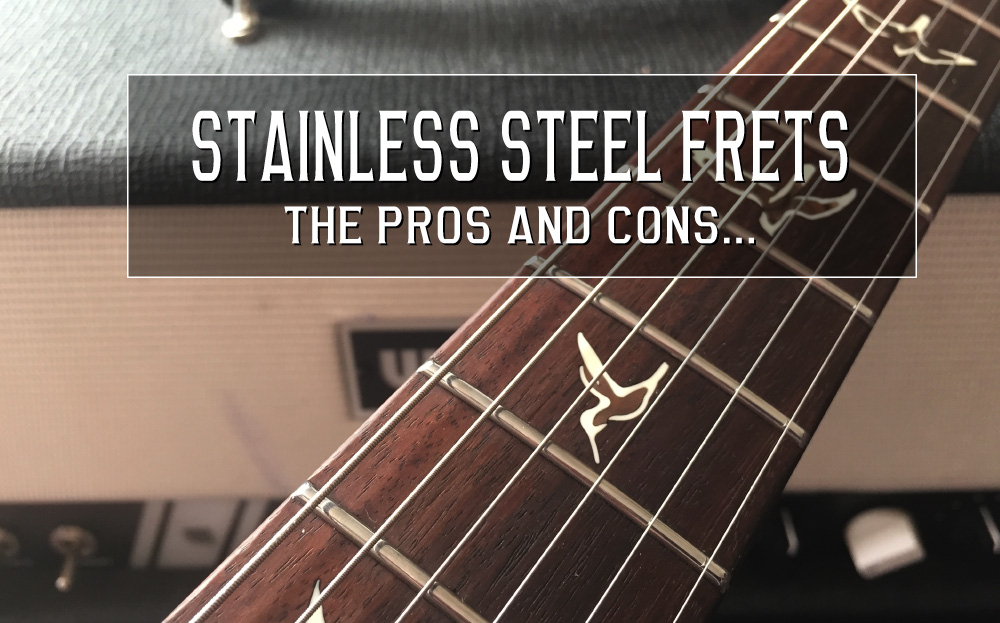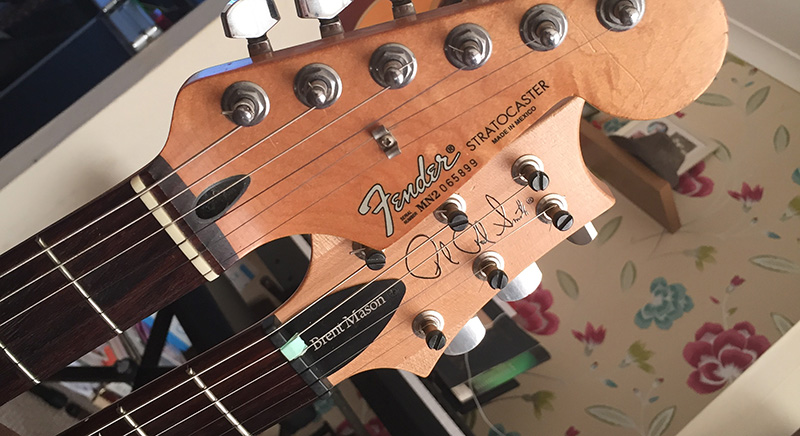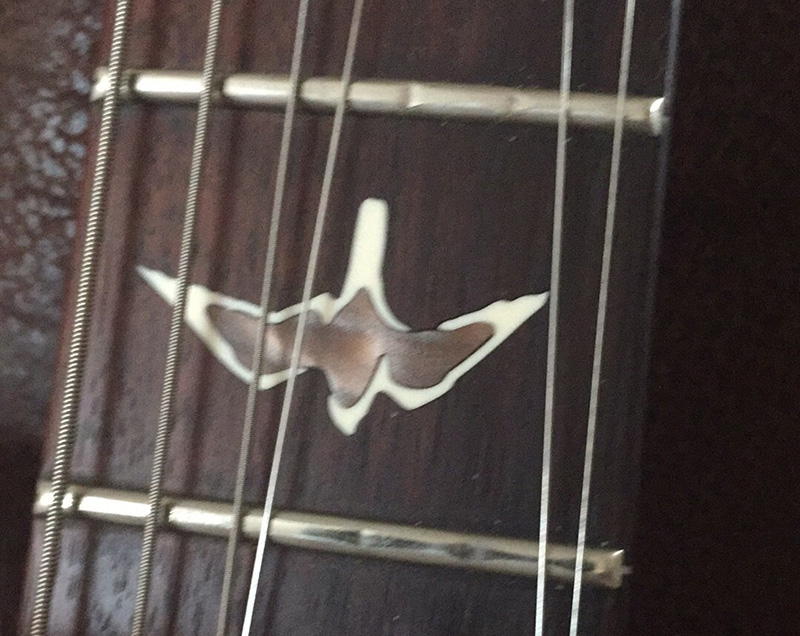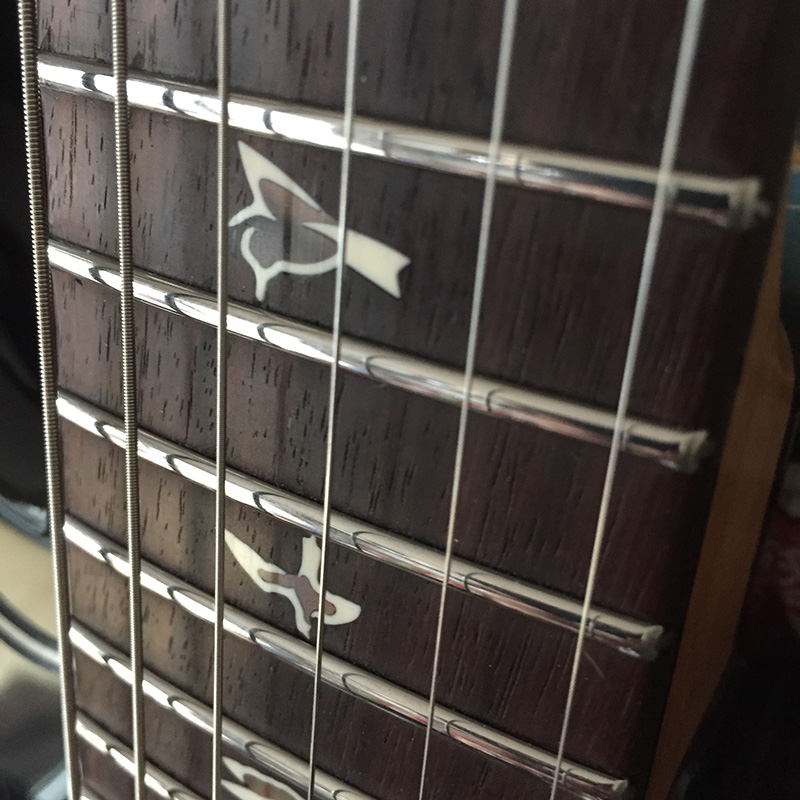
Well, I had my first EVER refret last week. I’ve never really cared enough about a guitar to get it done… well, either that or I haven’t kept a guitar for long enough and played it hard enough to even think about it. Or maybe, in the case of my favourite PRS, the frets have never been so darn weak as these are… were.
When you hear PRS talk about his guitars, all he cares about is the tone they produce. Everything is picked according to their place in the tonal spectrum… I’m all for that as my guitar is the most lively I’ve ever heard (unplugged as well as plugged in), but it would appear that in part of this trade off, the fret wires they chose for the Brent Mason signature modal are about as strong as a soggy piece of paper.
It all started to go really wrong about 18 months ago when I noticed I was getting a ‘sitar’ effect from my open D string, then about 9 months later it also started to happen on the open A string. Not only were the frets weak (I was at this point worried about the wear on them), it would appear that the nut was as well. So, I made do like a proper Englishman and stuck a small piece of cardboard under the strings in the nut. This not only meant my tuning stability went out the window, but also, some of the attack and brightness I love about my guitar went as well. Once this had become completely out of control I thought “Sod it, I’m going to have to get this fixed.”

Cardboard under the strings to stop ‘sitaring”
I contacted an excellent luthier who lives some distance from me, and discussed it with him, told him about the nut and showed him this photo of my current fret wear. We arranged for the long ol’ trip to his workshop, so I put my beloved guitar in the car (as I knew I had a week without gigs) and drove it up to him, which was about 150 miles away. As we discussed the work that needed doing, we came to the conclusion that I needed a shim under the nut (as it would appear the nut wasn’t cut correctly in the first place) and a total refret… I decided to go all in and get stainless steel. The PRS BM model ships with PRS’ version of 6100 jumbo frets, which have always been a little high for me, so I took the leap of faith and went down to the slightly lower 6150s.

6 years of fret wear
The only guitar I’d ever really spent any time on with SS frets was Tom Quayle’s signature Ibanez and I liked the attack of them, the slight zing they provide and maybe some brightness… maybe. So, I thought “why not”. At this point, I put the question out on our FB group “Stainless Steel frets, pros and cons” and quickly got a thread full of “My Suhr has them, they are amazing” and so on, so I was confident I had made the right choice!
When my guitar arrived back with me, I had 1 day to familiarise myself with it before I was due to play an all-day gig. But, as work is mental busy right now, I literally only had the time to make sure the neck was good, all the notes sung out and I could still do some of the ridiculous bends I like to show off with (I bend up to a 4th). Once I had this clear in my mind, my guitar went back in the case and the first time I properly played it was at the gig. I know, crazy, right?
The first thing you notice is that they are SO smooth it’s like there’s almost nothing there, it feels like there is hardly any resistance between your strings and the frets, so bending is MUCH easier. The first song in our set has no guitar solo in it, so I was feeling fine… when my first solo arrived in the second song, I totally over-bent the minor 3rd bend and it was hideous, but as I’ve been doing this for a ‘few’ years, I could quickly adapt and from there on in, my intonation was pretty much on point. I found that the bends were easier and took much less effort, but most surprisingly, vibrating the note at the top of the bend was considerably easier as well (my bent note vibrato isn’t great, so any help is appreciated).

Oh!!! Shiny new Stainless Steel frets for the win!
One of my biggest fears is that my string life is going to reduce somewhat, but it’s a minor worry as I am extremely picky about having new strings for each gig. I just can’t play live unless they are new and slinky to the feel and yes, that does mean I use Ernie Ball strings – after 30 odd years, they just feel right under my fingers. I’ve tried all the others, but always come back to EB regular slinky’s. As those strings are nickel wound, they aren’t the strongest strings on the planet, and going up against the SS frets I expect they won’t last as long… purely due to the fact that nickel frets against nickel strings means that the ‘damage’ caused by playing will be pretty well evenly split between the frets and strings. But, as these are now up against a much harder fret material, they will take the majority of wear and tear. However, every time I do break a string, it’s over the bridge or over the pickups (I tend to play hard when I’m really “in the zone” – lol at myself for saying that) and have never, according to my failing memory, broken a string over the fretboard, so time will tell if this will happen.
Tonally, SS frets appear to make everything a little zingier, maybe a little brighter. Although, to be honest, I don’t know if that’s my head playing tricks on me. As they are bright, shiny and new, does it mean my brain is telling the tone is? To test this I recorded my guitar direct through my sound card, the same line I had recorded a week before (this is how I test effect plug ins) and the difference was negligible, maybe slightly more attack. I’m almost certain to the point of arrogance that once it was going through my pedals and amp, the sound coming out the speakers was not that different. I’ve seen a lot of talk online about the frets being brighter, but I’m not sure I can hear it that much, maybe a little, but certain nothing major. It’s more of an attack thing, and that’s more of a response issue than tonal, I think.
The tech who did the job used the phrase “You’ll never regret it, or have to refret it” which is reassuring as I play really hard when I’m in country mode and that tends to be a lot of what I am doing these days. So I am hopeful that the massive expensive I have laid out will be an investment for life. After spending a lot of the day playing this guitar at an all-day gig on Saturday, I’ve come to the following conclusion about SS frets. If you have a guitar you love and you want a refret, just get them done with the SS frets… it’s almost like your finger strength has been increased!
PROS: considerably longer fret life, bends are much smoother, vibrato is much easier, more responsive to your attack, they never get dull.
CONS: string life (if you are using nickel strings) will be diminished, expensive.
Seems to be a no brainer really!



I read somewhere that evh puts them in his Wolfgang guitars.
I have 6 guitars with SS frets ( 2 EVH Wolfgangs, 2 Ernie Ball Stingrays, Ibanez AZ Prestige and Premium) …RE string life…IMO the rougher the fret’s finish, the shorter your string life will be coz not all SS frets are created the same, My Wolfgangs have the smoothest finish and strings would last just about as long ( or longer) as any nickels that I have. So based on my years of playing this is subject partly a myth. It just depends on the fret’s surface
The thing is, I wonder, if they have started to skimp on SS frets nowadays? Is there a scam going on? For the first time, last week, I was told by an old friend at a jam, that I haven’t played with for a long time, that he has started to get dents on his ss frets after 2 years only. So I said “you’re full of it…” and the next day of jam he brought that guitar with him for me to check. They FELT like SS, bended like butter but I could see the dents too, very clearly, like on regular frets. He used 011 set, nickel on steel and no SS strings.
It was after 2 years.
I still didn’t believe him, and then figured out he must’ve been subject to some scam going on. Then again I figured out, that the wear and tear of any fret doesn’t show up as RUST, never did and never will. There are just grooves of wear in the fret, and it hasn’t a zot to do with that they are stainless steel. It has to do with hardness and resistance to wear and erosion. Never heard of any other fret rust anyway. So by all means, companies can sell “Hey SS frets on this guitar” but when it comes to warranty, it’s still stainless, not wearless.
I have 2 guitars from around 2005-2006 with huge railroad tracks on them of SS frets, and have yet to see any kind of coloring, blemish or hint of a dent anywhere. I use SS strings too on them, as I have nickel allergy. That’s why I think he has been scammed by the one who did the refret.
So I think very well companies buy 1000′ of crap SS wire and use them as frets. Especially Asian ones. So SS can very well comes in softer alloys, and still keep the SS tag on them without being exposed for scam. And sure, they’ll wear more efficiently, but if it’s just 2 or 3 more times than regular frets, I wonder what the point is – now – with SS frets at all. If they are starting to skip on the QC.
I had SS frets installed on my Martin D28 Marquis- also went up a size (6105 i think?) and I don’t hear a difference in tone. The guitar was bright AND bass-y before and it still is w the SS frets. The slightly larger fretwire seems to make it easier to fret chords and they are very easy to do bends on. After about 8 months of playing on them pretty hard there is not a trace of fret wear. Strings wearing out fast does not seem to be an issue either.
Another bonus is they are very shiny. They reflect light almost like a mirror and it gives the otherwise minimally appointed guitar (other than the herringbone trim) a real blinged out look that I kinda dig. It was expensive to have the shop do the refret but I would recommend bc it sure seems like I’m not going to have to worry about fret wear anymore for that particular guitar.
Just curious, is there an obvious color difference? Like would it stand out if one had a single SS fret next to the standard frets?
If you had great lighting and perfect eyesight maybe a super subtle one…
Smoother frets wear less on the strings…i think that is correct. I have two guitars with SS frets and there is no downside in my mind. They are a joy to play and really help nuance you playing~!
any of you did a serious research /about ss vs steel frets // steel //any high carbon steel is much harder //not vs brass / but vs iron or steel/stainless alloys,,ss steel / not german ww2 lol / is a alloy of steel and other metals/LOOK ON NET /stainless steel is a substential softer than normal steel ,,so talking that ss frets eat strings faster or that ss strings eat frets faster tha normall steel ones is a idiot s tale ,, like that titanium is 3x stronger than steel etc// it is only by weight usefull for some instances better than steel ,, bits of drills and top knives // ment to stay sharp //still are steel , no ss steel so n i get on hewy metal guitar steinless steel ,sound like harderm in fact steel / is much harder ,denser than ss /steel // lol ss steel name is joke// naci soft steel frets killing mi strings ,,must be naci magic
You are literally using // as a form of valid punctuation as well as numerous other ridiculous looking behaviors while calling other people “idiots”
From another blog: normal nickel/copper (“silver”) fret wire hardness runs about 180 to 200 on the Vickers hardness scale (HV5), depending upon the maker. Jescar EVO is about HV5 240 to 250. Jescar SST is a 305 stainless steel with a HV5 of 250. String wear will depend upon the string material (most strings in use are “nickel” rather than SST) and fret finish, but in general, a softer string material will wear more quickly on a harder fret material, especially if the fret finish is abrasive rather than smooth. Fret finish is very important for SST frets.
Stainless steel comes in all kind of flavors. Common 304 stainless steel is indeed softer than carbon steel. But then there are (for example) 17-4 or 18-8 “precipitation hardened” stainless steels that are much harder. Steel metallurgy is very complex. Not all stainless steels are the same. There are hundreds, if not thousands of different steel alloys. Do your research.
At least for me, stainless natural brightness seems to magnify even the slightest fret buzz or fretting sloppiness. Its especially evident when using a modeling amp, high gain distortion, or effects like flange. It does sound brighter. I’ve had three necks with Stainless and had the same problem with each. I’ve ultimately reverted back to nickle. They are more forgiving. And even playing 3-4 hours per week (sometimes more) it’s still years and years before one is even close to needing a refret. So for me, the lesson is nickle all the way.
Chubby, I agree with you. I don’t care for the brightness that SS frets impart. Additionally, I will install SS frets on my guitars that have active electronics, because I can’t dear the difference with EMG pickups, but I will not install them on my guitars with passive pickups. I do enjoy the way the SS frets feel and of course, their durability.
I can confirm that the brightness is 100% noticeable just as everything mentioned above. No kidding, I know this because I own 2 American Special Telecasters and recently did a refret in my most used one; I went for SS frets because a friend who recently bought a Yamaha Revstar with SS let me try his and I liked how smooth they were. So I got them installed, and as the tone nerd I am (and everyone here is im sure) I proceeded to A/B, same pickups in both guitars btw, (Texas Specials) which I have to admit are inherently on the bright side, but now the SS Tele is brighter and more nuisance’d, it’s logical that it’ll affect tone just like different picks do, but I didn’t think it be as much.
As a conclusion I prefer the nickle frets and will probably just refret my other tele ( when it’s necessary) with durable Jescars which I have on a D’Angelico guitar and they are beautiful. My SS guitar is now my everyday guitar for practice since I can dig in knowing I don’t have to worry about fretwear but I like my tone less “zingy” so when recording I’m preferring nickle hands down.
Have Parker Nitefly with SS frets and love the feel. Have a ’70’s Les Paul Deluxe that needs frets and considering SS. I am curious: can a shop that does not have a Plek machine do the leveling properly; not to mention additional cost (though the Plek is arguably worth it).
Why on Earth would string life be diminished by having stainless steel frets on?
The fact frets are harder doesn’t automatically mean they’re going to eat strings.
If you take some time to think about it, pressing down unwound strings hard will indeed result in Vs into frets over time just like rubbing wound ones while bending will scratch especially wider frets over time. But the other way around? Those frets are smooth hard surfaces, you can rub them all day against whatever you want.
I agree with all that you say, if the frets are smooth they cannot wear the strings. But even if the strings did wear don’t you change them anyway.
I have a Music Man Valentine which has stainless steel frets, and it sounds ridiculously bright. I’m goinna have it re-fretted with conventional frets.
Consider changing to lower valued tone pots like 250k as this has considerable more affect on your tone sweep and how much top end your guitar will/can have
The pros and cons of stainless steel frets, an often overlooked but crucial component among guitar parts. The durability and smooth playability of stainless steel frets can significantly enhance your playing experience, though they might come at a higher cost and require more specialized maintenance. Understanding the impact of these frets on your guitar’s sound and longevity helps in making an informed decision, ensuring that your choice of guitar parts aligns with your playing style and needs.